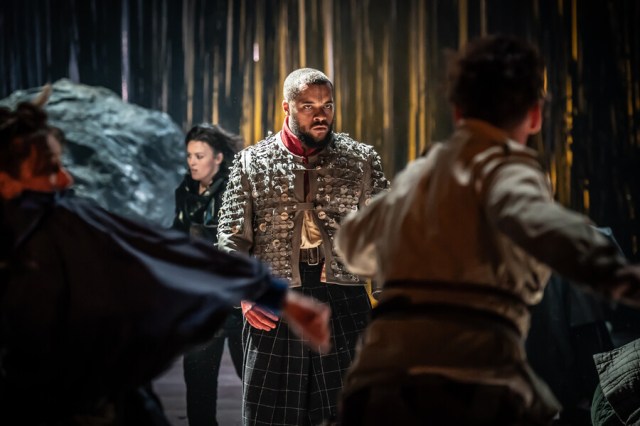Macbeth starring Reuben Joseph at the RSC – review
Wils Wilson’s other-worldly production continues at the Royal Shakespeare Theatre until 14 October

There’s a multitude of Macbeths about at the moment, from Shakespeare’s Globe to an imminent Shakespeare North. Ralph Fiennes and David Tennant are both warming up for their murderous monarchs too, so it probably makes sense for the RSC to get theirs in early – not just because they’re the Bard’s house band, so to speak, but because this production actually sets a rather decent bar.
Director Wils Wilson’s Scottish pedigree is very much to the fore, with authentic casting and accents across the company and a thoroughly Caledonian feel to Alasdair Macrae’s eerie, pipes-inspired score and Georgia McGuinness’s kilty costumes, and there’s a profusion of adventurous ideas and unsettling stage magic on display.
From the first appearance of the weird sisters – and they don’t come much weirder than this trio of gyrating, shape-shifting androgynes – through a kind of embryonic sac in the floor of the stage, the scene is set for a raw, sometimes random but always engrossing interpretation of old Will’s slickest thriller.
Even if some of the ideas don’t quite work – the hybrid time periods of ancient mystical Scotland and modern technology jar occasionally – there’s no shortage of ambition and a real sense of integrity about the approach. The much-vaunted topical rewrite of the porter scene by comedian Stewart Lee is a good example: it can’t help dragging the audience out of the pacy thrust of the central narrative, but on its own terms it’s very funny, with Alison Peebles’s wonderful delivery showcasing a particularly barbed dig at Russell Brand alongside the political gibes.
However, the overall cumulative effect is constantly intriguing and imaginative, with Kai Fischer’s atmospheric lighting and Claire Windsor’s extraordinary sound design – fronted by Macrae’s bizarre, discordant tones of tuba, bass trombone and sousaphone – doing much to create an other-worldly landscape against which the bloody action plays out.
Reuben Joseph is clear and suitably conflicted in the title role, Valene Kane a little more restrained in her rather sidelined Lady M, while the cross-gender recasting of Banquo, Duncan and the two princes Malcolm and Donalbain is less intrusive than it might be thanks to some strong performances, notably from Anna Russell-Martin as Banquo.
The staging is full of weirdness too, with dead birds dropping from the sky between scenes, the witches haunting every murder and carting off the bodies, and a progression of apparitions crafted seemingly out of thin air to create a terrifying portent of the future for a tyrant determined to hold on to his crown at any cost.
For all its off-the-wall peculiarity, the production ends up being oddly conventional – therefore probably highly appealing to the purists – and a narratively well-drawn retelling of the story. With its combination of strangeness, Scottishness and accomplished steadiness, it certainly earns its place as the only Shakespeare play in the RSC’s current repertoire.


















